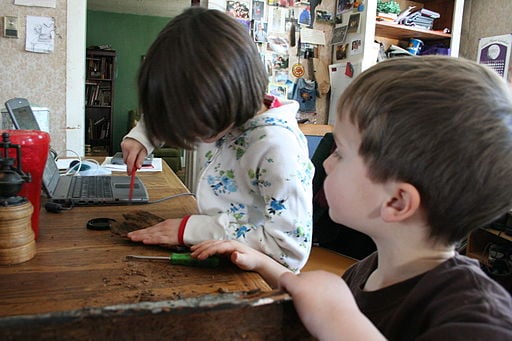Zach was talking to his grandmother this weekend on speaker phone, and she asked how homeschool was going.
“It’s good.”
“It is? What are you learning?”
“Nothing. It’s easy.”
“It’s easy? Well, aren’t you learning writing and math and history?”
“Nope. We don’t do those. Everything is easy.
Which would be bad news if it were true. But it’s not. It’s just that Zach has to say that everything is easy to maintain his sense of himself as being good at school. He rushes through work because he believes that smart kids get their work done quickly. If I point out that he made a mistake and ask him to fix it, he stomps, protests, and often cries. If he feels like something is beyond his reach and he can’t figure out how to get out of doing it, he melts down.
Good times.
But I soldier on. Because according to Ellen Galinsky in her book Mind In The Making, kids need to learn how to take on challenges. Children who learn how to manage the stress that comes with challenge perform better in school and in life. Without that ability, they’ll back out of taking the AP class or asking out the spunky girl or sticking with basketball when they don’t make the varsity team.
Galinsky suggests that parents follow Carol Dweck’s advice. Dweck is a researcher at Stanford who says that we need to praise effort that leads to success, not innate qualities like intelligence or athletic giftedness. Instead of telling a child, “You’re such a smart girl” after she completes a difficult puzzle, you should say, “You kept working and working on it, and eventually you figured it out.” Dweck found that children who were praised for their intelligence were less likely to work hard on more difficult puzzles than those students who were praised for their effort. That sounds reasonable.
Charlotte Mason offered her own advice on how to help children rise to challenges, and it sounded less reasonable to my modern ears when I first read it. She wrote over a century ago that parents need to cultivate the habit of perfection.
What? Perfection? How am I going to get a stressed out kid to try more difficult work if he knows that anything but perfection will be unacceptable? Maybe they didn’t have tangrams in Victorian England. (This morning Zach shouted “I quit!” before he started each tangram puzzle I presented, in part I think because he was so frustrated by not being able to get the pieces to sit together perfectly.) And what happened to praising effort?
But as I read more, I realized that asking for perfection might be exactly what Zach needs. Maybe we need to help him learn that if he keeps working on something without giving up he can do it correctly. There is no need to rush. We aren’t measuring speed, but accuracy.
Mason writes: A child should not be assigned work that he isn’t capable of doing perfectly, and perfect work should be expected as a matter of course…His moral integrity is compromised from getting by on less than his best.
It’s been a revelation to me. We do it until it’s perfect. Every problem. Every date. Every homework assignment. Every clean up session. I’ve spent years telling Zach to lighten up and accept that things don’t have to be perfect. “It’s good enough, buddy.” But now I’m rethinking that strategy. I think I may have inadvertently made him more stressed out. He wanted to have the time to put his sock on just so. I wanted to get out the door. He wanted to erase his entire paper and start over. I wanted to put away his homework so we could have dinner. He needed to process with me before he started an activity what the goal of the activity was. (Are we trying to get every single toy put away? Or are we trying to get as many toys put away as we can in the five minute we have?) I just wanted to get moving – without helping him learn how to manage his stress by setting a reasonable goal or setting a new goal when the first was out of reach. I need to slow down, and give him assignments or chores that he can do properly in the amount of time we have. Then I can praise him, as Dweck suggests, for working hard to set an appropriate goal and working hard to achieve that goal. Perfectly.
At least that’s what I’m thinking today. Thoughts? Is perfection a ridiculous goal?











